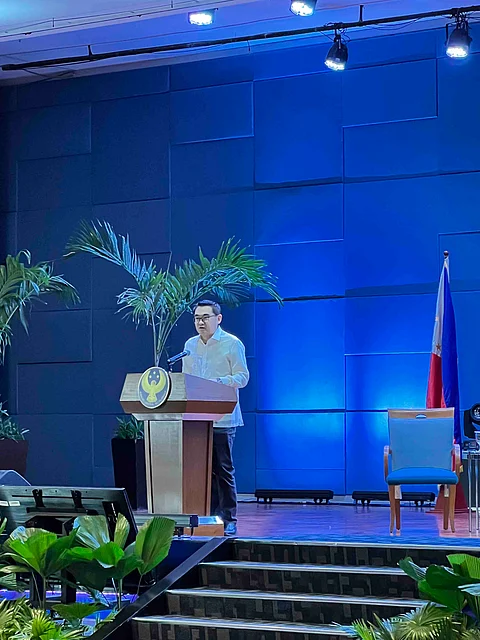
- NEWS
- the EDIT
- COMMENTARY
- BUSINESS
- LIFE
- SHOW
- ACTION
- GLOBAL GOALS
- SNAPS
- DYARYO TIRADA
- MORE

Special Assistant to the President for Investment and Economic Affairs, Secretary Frederick Go, called on the media to also focus on the positive aspects of recent US tariff pronouncements instead of only the negative implications. This comes amid concerns over the announced 100 percent tariff on foreign-made semiconductors and the 19 percent levy on all US-bound Philippine exports.
Speaking at the Economics Journalists Association of the Philippines Economic Forum 2025 held Monday at the Bangko Sentral ng Pilipinas in Manila, Secretary Go encouraged journalists to consider the “best-case scenario” regarding the tariffs.
“Let me also answer the best-case scenario, to be fair. I think the best-case scenario, as it is often said, is when there is a tariff imposed on all, then there is almost no tariff. That means everybody is reduced to a level playing field. For example, if the DOF imposes a VAT of 15 percent on everybody, then there's no disadvantage to any retailer, because everybody is uniform at 15. So, if the US imposes a semiconductor tariff on all countries, then it is as if there is no tariff, because then that becomes a level playing field for all,” Go explained.
Earlier, Semiconductor and Electronics Industries in the Philippines, Inc. (SEIPI) president Danilo Lachica described President Donald Trump’s announcement as “a catastrophe” for the Philippine semiconductor industry, fearing that companies may pull out investments and relocate to the US.
Secretary Go downplayed such fears, noting the high costs and impracticality of reshoring manufacturing facilities.
“If you believe that every company in the world will shut down their operations all over the world and reopen them all to America; if you believe that the labor force of America will want to do assembly testing and packaging, which is highly manual job; and if you believe that all these companies will abandon all their operations in the Philippines within a certain period, or if you believe that the whole world order will change, then that’s the worst case scenario,” Go said.
He emphasized the need to focus on what is best for the country rather than worst-case scenarios.
Go also clarified that nothing is final regarding the 19 percent tariff on all Philippine exports or the 100 percent tariff on semiconductors, stating ongoing lobbying efforts with US authorities.
“Today is a gray space. We are still seeking clarification from the USTR side, and we are lobbying that our semiconductor sector, likewise, be exempted. We still have to schedule a call or a meeting with them on this matter. So far, everything you hear is a media or social media announcement,” Go said.
Trump announced that the US will impose a tariff of about 100 percent on semiconductor imports, but this will not apply to companies manufacturing in the US or those committed to doing so.
“But we are hoping that what we do here in the Philippines for the semiconductor industry, which is assembly, testing, and packaging, to be part of the process that the US may not (really) want to do. So we have expressed that assembling, testing, and packaging is a process that semiconductor companies would probably want to outsource,” Go told reporters.
Despite the sweeping tariffs affecting 150 exporting nations to the US, Go described the situation as a “level-playing field” rather than a disadvantage, and urged the country to rely on its strengths.
“For example, the PPP Code, the CREATE MORE Act. What business (really) wants is predictability in doing business. Once we have a level-playing field, or predictability in the playing, then we go back to what we have, and the advantages we have, which is our people, CREATE MORE, PPP Act, Green Lanes,” he said.
He added that the government’s negotiating team is actively “working on getting several Philippine exports exempted.”
“There is a definition of products that… for example, an exporting country produces in abundance that cannot be produced in the United States, you can seek exemptions for such products,” Go said, without naming specific products due to a non-disclosure agreement related to tariff negotiations.
